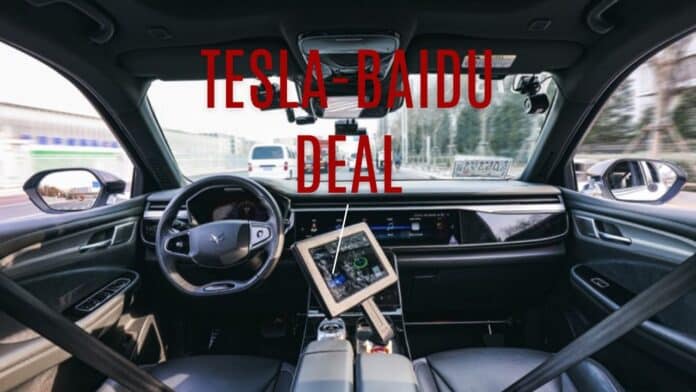Tesla China Deal: Paving the Way for Self-Driving Technology Rollout
Tesla has reportedly struck a significant deal with Chinese search giant Baidu, signaling a major leap forward in the electric vehicle (EV) industry. The collaboration aims to accelerate the deployment of self-driving technology in China and beyond.
The Partnership
According to insider sources, the agreement between Tesla and Baidu involves several key components:
- Data Sharing and Integration: Baidu, known for its expertise in artificial intelligence (AI) and search algorithms, will provide Tesla with access to its vast data repositories. This data includes real-time traffic patterns, road conditions, and behavioral insights from millions of Chinese drivers. In return, it will share anonymized data from its fleet of electric vehicles, enhancing Baidu’s machine learning models.
- Localization and Mapping: Baidu’s high-definition maps and localization services will be integrated into Tesla’s Autopilot system. This move is expected to improve navigation accuracy, especially in complex urban environments and challenging weather conditions.
- Regulatory Cooperation: Both companies will collaborate closely with Chinese regulatory authorities to expedite approvals for self-driving features. By aligning with local regulations, Tesla aims to roll out advanced driver-assistance systems (ADAS) and autonomous capabilities more swiftly.
Implications
1. Faster Deployment of Autonomy
The partnership with Baidu provides Tesla with a strategic advantage in the race toward full autonomy. By leveraging Baidu’s AI capabilities and extensive data, Tesla can enhance its Autopilot system, making it more robust and adaptive to diverse driving scenarios.
2. Access to China’s EV Market
China is the world’s largest EV market, and Tesla has been keen on expanding its presence there. With Baidu’s support, Tesla gains deeper insights into Chinese consumer preferences, road infrastructure, and regulatory nuances. This knowledge will be invaluable as it tailors its self-driving features to meet local demands.
3. Competition and Collaboration
While Tesla and Baidu are competitors in the autonomous driving space, this partnership demonstrates the industry’s willingness to collaborate for mutual benefit. As self-driving technology evolves, cross-industry alliances may become more common, fostering innovation and safety.
Challenges Ahead
Despite the promising prospects, challenges remain:
- Safety and Trust: Ensuring the safety of self-driving systems is paramount. Tesla and Baidu must address concerns related to reliability, robustness, and transparency.
- Ethical Considerations: Self-driving algorithms face ethical dilemmas, such as prioritizing passenger safety over pedestrians or vice versa. Striking the right balance requires careful design and public discourse.
- Regulatory Hurdles: While China has been supportive of autonomous technology, regulatory approvals can be complex. Navigating these hurdles will be crucial for successful implementation.
Conclusion
The Tesla-Baidu partnership represents a convergence of cutting-edge technology, data-driven insights, and global ambition. As the world inches closer to fully autonomous vehicles, this collaboration sets a precedent for future industry collaborations. Buckle up—the self-driving revolution is accelerating, and Tesla and Baidu are at the forefront.















